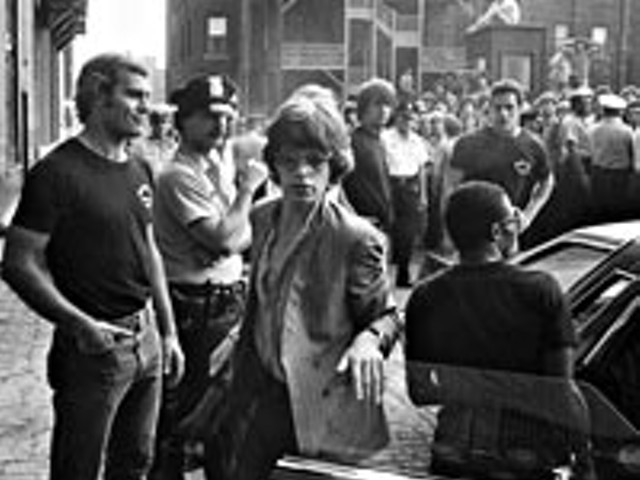What is being white? Is it believing that your ways are superior and right? Does it mean you’re no longer natural and naive, but cultured and worldly, that you speak in a dialect and wear clothes associated with sophistication? Is it having a CARE package of privilege follow you around, or is being white merely having the capacity to pass on what you’ve learned and not make waves challenging its source or purpose? What if you appear to possess all of the above qualities — and you’re black?
Plowshares Theatre Company presents The Black White Man, now through June 1 at Marygrove College. Written by OyamO, playwright in residence at the University of Michigan, the play takes place in the heart of colonialism, an intentionally foggy area where good hearts buy into bad-hearted schemes.
In 1890, two American missionaries, one black and one white, were requisitioned by peculiar King Leopold II of Belgium to bring Christianity to his subjects in the Congo, because, as he told the two, one day his Congo leaders will rule the world and he wants to prepare them. But by 1910, Leopold’s real interest was economic, because the Congo held the world’s largest supply of rubber, a material in great need due to the automobile’s newfound popularity. The missionaries found themselves within a complex mesh of intersecting agendas, puzzling traditions and foreign illnesses.
When a fatal fever takes the life of his fellow man of God, William Henry Shepard becomes the first Negro to run a Presbyterian mission in the Congo. Shepard does what a good missionary is expected to do, however he dares to harbor a dream of uniting the Congo into one nation run by African and American Negroes, an idea unpopular with his religious and political superiors.
Shepard’s skin may be black, but to the Congo natives nothing else about him is — he only wears the skin of a Bantu. This “black white man” does his best to overcome the inherent absurdities of trying to sell a sexless white religion to people who aren’t looking to buy. Shepard abhors cannibalism, yet practices a religion that apparently goes through the ritualistic motions of cannibalism (eat of the flesh, drink of the blood, etc.). He tries to profess the evils of slavery when the ex-slave slave-owner he’s talking to knows Shepard’s parents were owned by Christians. It’s an uphill battle touching upon the myriad severed hands and ugly heads of colonalism’s hunger to exploit.
In an information-concentrated play that runs well over two hours, OyamO barrages us with names, people and multilayered intentions, perhaps giving us a taste of how Shepard must have been overwhelmed.
OyamO is careful to create multifaceted personalities, except when it comes to King Leopold. Although James Bowen’s performance is very entertaining, the one-dimensional Flemish fop sticks out like a John Waters caricature in a history book, undermining the story’s potential.
Shepard is played by Marlon Bailey, who relives the man’s struggles with a whole-souled sensitivity. He sits on a tree trunk as the centerpiece around which OyamO unfolds his swirling story. And he speaks directly to us about his most intimate thoughts while interacting with the live-action realities moving on- and off-stage, illustrating the timeline of his missionary life in a visual array that’s well handled by Plowshares’ talent.
At the outset, Shepard is clearly the protagonist of the play — but by the end, the question lingers as to whether or not he’s the antagonist of the people of the Congo he attempts to uplift. OyamO presents a man who ultimately lacks the courage it takes to give birth to a nation, exemplified as Shepard’s wife, Lucy, gives birth to two babies who never breathe life.
But OyamO’s presentation of Shepard is troubling. At several points, we hear a Southern white voiceover tell us how you could always count on Shepard, and what a “good Negro” he was — little anecdotal audio bits painting him as a puppet for the white folk — but at the same time, Shepard clearly means well.
Just exactly where OyamO intends to leave us is unclear, which may be the point, or maybe it’s as far as OyamO can understand the man. But the resulting haziness tends to heighten our sympathies for Shepard, a black white man with the right dream at the wrong time.
Plowshares Theater Company’s production of The Black White Man by OyamO plays through June 1 at Marygrove College (8425 McNichols, between Wyoming and Livernois, Detroit). For more information, call 313-872-0279 or visit www.plowshares.org.
Anita Schmaltz writes about theater for Metro Times. E-mail [email protected]




